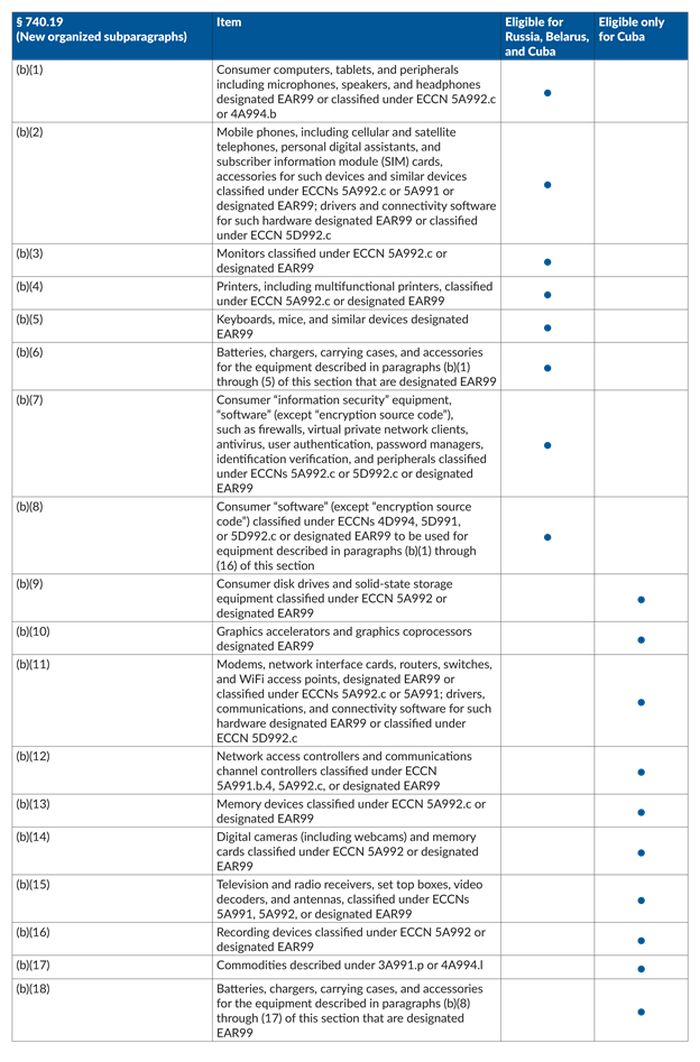- within International Law topic(s)
- in United Kingdom
- with readers working within the Automotive, Banking & Credit and Basic Industries industries
- within Compliance topic(s)
Last year, we published an update on BIS's foray into prohibiting EAR99 items for export to Russia and Belarus. We noted (somewhat in jest) that kitchen sinks may one day be added. Well, that day has come. Stainless steel kitchen sinks are officially prohibited for export to Russia and Belarus.
In our recent blog article on Russia Sanctions, we noted that the U.S. Office of Foreign Assets Control (OFAC) beefed up its sanctions against Russia's financial infrastructure. That same day, the Bureau of Industry and Security (BIS) also unveiled a draft regulation of its own on Russia. Those BIS regulations have now been implemented as a final rule published on June 18, 2024.
In summary, the new rule further tightens export controls on Russia and Belarus in the following ways:
- Adding additional EAR99 items prohibited for export without a license;
- Imposing a new software license requirement for certain EAR99 software;
- Narrowing the scope of commodities and software that qualify for the License Exception for Consumer Communications Devices (CCD);
- Consolidating Russia and Belarus sanctions into a single section of the Export Administration Regulations (EAR); and
- Adding addresses to the Entity List structure.
We address each of those key changes in more detail as follows.
1. The Kitchen Sink Rule: Prohibiting Further EAR99 Items For Export Without a License
The new rule adds 522 new Harmonized Tariff Schedule (HTS) six-digit codes to Supplement No. 4 to Part 746 of the EAR (including stainless steel kitchen sinks!) and certain riot control chemical agents to Supplement No. 6 to Part 746. Other prohibited items include certain kitchen tables (HTS 7323.10, 7323.91, 7323.92, 7323.93, 7323.94, 7323.99) and feather dusters (HTS 9603.90). Pursuant to the new rule, Supplement No. 4 now covers 18 additional chapters of HTS codes. These items will now require a license for export or reexport to, or transfer (in-country) within, Russia or Belarus.
Given that some of the prohibited items may go beyond what we would normally think of as supporting the Russian military industrial base, we suggest our readers to take the time to review the new additions.
The license requirement for these additional items are effective June 12, 2024.
2. New Controls on EAR99 Software
Effective September 16, 2024, the new rule will extend license requirements to certain EAR99 software (in new paragraph EAR § 746.8(a)(8)).The EAR99 software that will require a license for export, reexport or transfer to or within Russia and Belarus are as follows:
- enterprise resource planning (ERP);
- customer relationship management (CRM);
- business intelligence (BI);
- supply chain management (SCM);
- enterprise data warehouse (EDW);
- computerized maintenance management system (CMMS);
- project management software, product lifecycle management (PLM);
- building information modelling (BIM);
- computer aided design (CAD);
- computer-aided manufacturing (CAM); and
- engineering to order (ETO)
The license requirement also includes software updates of the specified categories. Thankfully, BIS has created two carveouts where a license would not be required:
if such EAR99 software is destined to entities "engaged exclusively in the agriculture or medical industries"; and
if such EAR99 software and items controlled under Export Control Classification Numbers (ECCNs) 5A991, 5A992.c and 5D992.c are destined to certain types of civil end users in Russia and Belarus including, among others, wholly-owned subsidiaries, branches, or sales offices of U.S. companies or companies headquartered in A:5 and A:6 countries and joint ventures of the same between U.S. and A:5 or A:6 companies.
3. Narrowing the Scope of License Exception CCD
The EAR includes a license exception for certain consumer communications devices and software for Cuba, Russia, and Belarus (known as License Exception CCD). For Russia, that exception is limited to personal communication devices and software for use by individual consumers (not business or enterprise products). However, the exception may be used to export to commercial entities and enterprises not owned or operated by the Russia government. See BIS Russia Export FAQs (May 2, 2022).
Effective June 12, 2024, the new rule narrows License Exception CCD for Russia and Belarus to restrict certain devices and software as follows:

4. Consolidation of Russia and Belarus Sanctions Into a Single EAR Section
Prior to the new rule, license requirements for exports, reexports, and transfers (in-country) to or within Russia and Belarus were primarily found in three sections of the EAR: Sections 746.5 (for a variety of industrial goods), 746.8 (mostly for items on the Commerce Control List and items caught by the Russia and Belarusian-related foreign direct product rules), and 746.10 (for luxury goods).
Now, all of these license requirements are being consolidated into a revised and expanded Section 746.8. This is a welcome change that should make it easier for readers navigating the regulations.
5. Changes to the Entity List Structure – Addresses with High Diversion Risk
In addition to adding five entities to the Entity List, BIS also included eight addresses titled as Address 01, Address 02, and so forth. This is a change from how BIS normally adds entities to the Entity List. With the new rule, exporters will need licenses for any entities who use the newly included addresses.
Typically, the involvement of a company co-located with a listed entity presents a red flag in export transactions, but now BIS is adding definite license requirements for addresses that are repeatedly used by companies engaged in activity contrary to U.S. national security or foreign policy interests. So exporters and practitioners should screen entity names and addresses.
We will continue to monitor new sanctions and export control regulations on Russia and the impact and provide our updates here.
The content of this article is intended to provide a general guide to the subject matter. Specialist advice should be sought about your specific circumstances.



